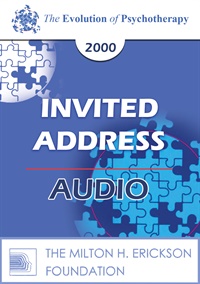
- Average Rating:
- Not yet rated
- Topic Areas:
- Invited Addresses | Psychotherapy | Relationships
- Categories:
- Evolution of Psychotherapy | Evolution of Psychotherapy 2000
- Faculty:
- Erving Polster, PhD | Judd Marmor
- Duration:
- 1 Hour 29 Minutes
- Format:
- Audio Only
- Original Program Date:
- May 25, 2000
- Short Description:
- Dr. Polster will portray connectedness as a key human aspiration and specify four pathways along which lost connectedness may be therapeutically restored: Person to person, enhancing relational experience and belonging; moment to moment, restoring continuity and fluidity; event to event, recovering life's storyline; and characteristic to characteristic, integrating the self.
- Price:
- $15.00 - Base Price
Tags: Psychotherapy Relationships

- Average Rating:
- Not yet rated
- Topic Areas:
- Invited Addresses | Psychotherapy
- Categories:
- Evolution of Psychotherapy | Evolution of Psychotherapy 2000
- Faculty:
- James Bugental, PhD | Mary Goulding, MSW
- Duration:
- 1 Hour 21 Minutes
- Format:
- Audio Only
- Original Program Date:
- May 25, 2000
- Short Description:
- EP00 Invited Address 3a - Psychotherapy Isn't What You Think - James F.T. Bugental, Ph.D. This address will review the long-held concept of the client seen as a passive source of information and receptacle for therapist feedback. Dr. Bugental will propose an amendment to this view which makes more use of the client's own conscious powers.
- Price:
- $15.00 - Base Price
Tags: Psychotherapy James Bugental
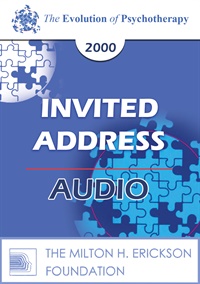
- Average Rating:
- Not yet rated
- Topic Areas:
- Suicide | Invited Addresses | Law & Ethics | Psychotherapy | Religion
- Categories:
- Evolution of Psychotherapy | Evolution of Psychotherapy 2000
- Faculty:
- Thomas Szasz, MD | James F. Masterson, MD
- Duration:
- 1 Hour 28 Minutes
- Format:
- Audio Only
- Original Program Date:
- May 25, 2000
- Short Description:
- This address is a radical inquiry into voluntary death ("death control"). Is suicide legal? Should involuntary suicide prevention be legal? Should physician-assisted suicide be legal? Personal careers, professional identities, multi-billion dollar industries, legal doctrines, judicial procedures and the liberty of every American hangs on our answers and on our justifications for them.
- Price:
- $15.00 - Base Price
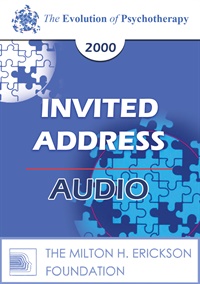
- Average Rating:
- Not yet rated
- Topic Areas:
- Children and Adolescent Therapy | Family Therapy | Invited Addresses | Abuse | Psychotherapy
- Categories:
- Evolution of Psychotherapy | Evolution of Psychotherapy 2000
- Faculty:
- Cloe Madanes, HDL, LIC | William Glasser, MD
- Duration:
- 1 Hour 28 Minutes
- Format:
- Audio Only
- Original Program Date:
- May 26, 2000
- Short Description:
- Ms. Madanes will present a new way of thinking about how injustice in the family can lead to marital and family problems. She will present step by step procedures for discovering an injustice in the family and resolving it effectively so as to solve major problems, violence and depression, panic, child and adolescent problems and sexual abuse.
- Price:
- $15.00 - Base Price
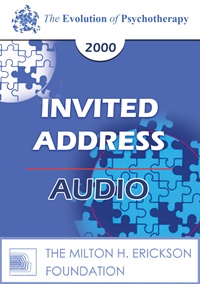
- Average Rating:
- Not yet rated
- Topic Areas:
- Invited Addresses | Psychotherapy
- Categories:
- Evolution of Psychotherapy | Evolution of Psychotherapy 2000
- Faculty:
- Michael White, B.A.S.W. | Albert Ellis, PhD
- Duration:
- 1 Hour 31 Minutes
- Format:
- Audio Only
- Original Program Date:
- May 26, 2000
- Short Description:
- All expressions of life are multi-layered, including people's descriptions of the problems they bring to therapy. An appreciation of this multi-layeredness of expression presents therapists with a multiplicity of options for therapeutic conversations. How can the multiple layers of expression be identified? How does this contribute to a range of options for re-authoring conversations?
- Price:
- $15.00 - Base Price
Tags: Psychotherapy

- Average Rating:
- Not yet rated
- Topic Areas:
- Psychotherapy | Invited Addresses | Brief Therapy | History of Psychotherapy
- Categories:
- Evolution of Psychotherapy | Evolution of Psychotherapy 2000
- Faculty:
- Mary Goulding, MSW | Ernest Rossi, PhD
- Duration:
- 1 Hour 24 Minutes
- Format:
- Audio Only
- Original Program Date:
- May 26, 2000
- Short Description:
- Beginning with what she learned from Fritz Perls, Eric Berne, Virginia Satir and Robert Goulding, Mrs. Goulding will discuss her current method of teaching and practicing psychotherapy.
- Price:
- $15.00 - Base Price
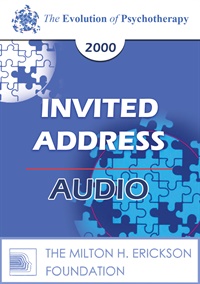
- Average Rating:
- Not yet rated
- Topic Areas:
- Invited Addresses | Relationships | Psychotherapy
- Categories:
- Evolution of Psychotherapy | Evolution of Psychotherapy 2000
- Faculty:
- Zerka Moreno | Alexander Lowen, MD
- Duration:
- 1 Hour 26 Minutes
- Format:
- Audio Only
- Original Program Date:
- May 26, 2000
- Short Description:
- Every individual, by virtue of his/her birth, and by virtue of his/her death, creates a minor social revolution. In this context, •tele" is the bonding factor. Its measurement and effect upon interpersonal relations will be examined.
- Price:
- $15.00 - Base Price
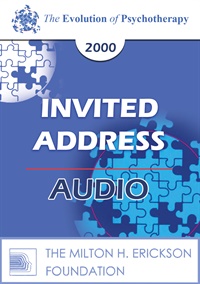
- Average Rating:
- Not yet rated
- Topic Areas:
- Invited Addresses | Cognitive Behavior Therapy (CBT) | Schizophrenia
- Categories:
- Evolution of Psychotherapy | Evolution of Psychotherapy 2000
- Faculty:
- Aaron Beck, MD | Miriam Polster
- Duration:
- 1 Hour 26 Minutes
- Format:
- Audio Only
- Original Program Date:
- May 26, 2000
- Short Description:
- There have been some surprising developments in cognitive approaches to schizophrenia in recent years. Dr. Beck will describe the clinical trials, some of the therapeutic strategies used to modify, if not eliminate, delusions and hallucinations, and a cognitive model for understanding paranoid psychosis. This understanding will enable therapists to add substantially to the improvement provided by medication.
- Price:
- $15.00 - Base Price
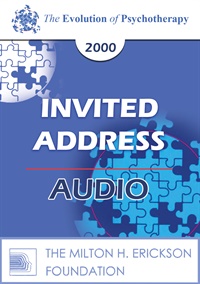
- Average Rating:
- Not yet rated
- Topic Areas:
- Psychotherapy | Invited Addresses | Borderline | Transference Focused Psychotherapy (TFP) | Transference / Countertransference
- Categories:
- Evolution of Psychotherapy | Evolution of Psychotherapy 2000
- Faculty:
- Otto Kernberg, MD | Aaron Beck, MD
- Duration:
- 1 Hour 28 Minutes
- Format:
- Audio Only
- Original Program Date:
- May 26, 2000
- Short Description:
- This presentation will summarize the strategy, tactics and techniques of TFP (Transference Focused Psychotherapy), its indications and contraindications, process and outcome studies of the Cornell University Personality Disorders Institute that developed this treatment over the past 15 years.
- Price:
- $15.00 - Base Price
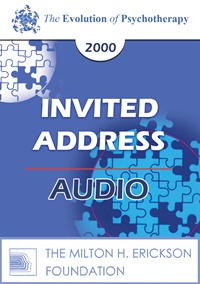
- Average Rating:
- Not yet rated
- Topic Areas:
- Invited Addresses | Psychotherapy
- Categories:
- Evolution of Psychotherapy | Evolution of Psychotherapy 2000
- Faculty:
- Albert Ellis, PhD | William Glasser, MD
- Duration:
- 1 Hour 23 Minutes
- Format:
- Audio Only
- Original Program Date:
- May 28, 2000
- Short Description:
- This address shows how clients can learn to get better rather than just feel better. They can learn to make a profound philisophical change, maintain it, and make themselves remarkably less disturbable even in the face of serious adversities.
- Price:
- $15.00 - Base Price
Tags: Albert Ellis Psychotherapy
Please wait ...

